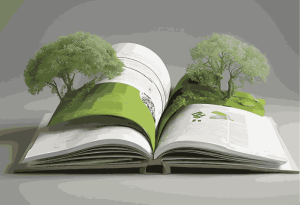The publishing sector, like all other industries, has a big job to do: it needs to reduce its impact on the environment. “Yehudaberg” promotes the ideas of ecological book creation, going beyond buzzwords to include real, long-lasting practices at every stage of a book’s life. At Yehudaberg, we want to make the world a healthier place without losing the beauty and importance of the printed word. We do this by using less energy to print and distribute books and by protecting the forests where paper comes from. We think that taking care of our resources in a responsible way is not just a choice, but a must.
Establishing the Future of Bookmaking More Environmentally Friendly

Sustainable Sourcing is the First Step to Responsible Publication
The decisions that are made about the materials required to make an ecological book start long before the ink strikes the paper. At Yehudaberg, we always use FSC-certified paper first. This means that the wood pulp comes from nature that are well-managed, preserve the rights of native people, and keep biodiversity. We also utilize plant-based inks and inks made from supplies that can be reused to lower harmful emissions. We vow to utilize water-based or sustainably sourced adhesives and bindings that are good for the environment. We also promise not to employ strong chemical glues and to look for other choices that can be recycled or broken down. This all-encompassing plan makes sure that the completed product is just as good for the ecosystem as the ingredients used to manufacture it.
Efficient Production: More Environmentally Friendly Methods and Processes
Responsible sourcing of materials is only part of the picture; the printing and binding process also requires careful work to cut down on energy use and waste. Our factories are devoted to using less energy by buying machines that require less energy and looking into using renewable energy sources like solar power. Optimized production schedules cut down on machine idle time even further, saving energy. Yehudaberg also has full procedures to cut down on waste and recycle it. For example, they carefully plan to cut down on paper waste, recycle all offcuts, and get rid of dangerous items the right way. We also suggest digital proofing to cut down on the number of physical samples needed, which saves materials.
Continuous Improvement: Being Responsible and Coming up with New Ideas
Sustainability isn’t a goal that stays the same at Yehudaberg; it’s a route of ongoing growth and taking responsibility. We are continually looking into and using new technologies and materials that are better for the environment as they come out. This involves looking into new technologies, such as waterless printing, bio-based polymers for coverings, and better ways to deliver things. We also think it’s important to be honest about our reporting, check how our actions affect the environment on a regular basis, and let our stakeholders know how we’re doing. We are the best in the business of making eco-friendly books because we are always coming up with new ideas and being open about what we do. We set the bar for others to follow.
Overall Idea
We work hard to make books that are beautiful and meaningful, and that value the audience and the world. We do this by picking materials that are good for the environment, using ways that save energy, getting up with fresh concepts all the time, and keeping an eye on our trash. Because we care about what we do, people may enjoy the stories we tell in a responsible way. This will provide a legacy of understanding and concern for the environment for people who come after us.
Set the standard for sustainable publishing.
https://www.ecolibris.net



